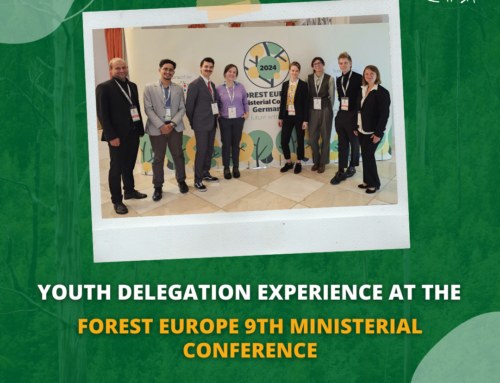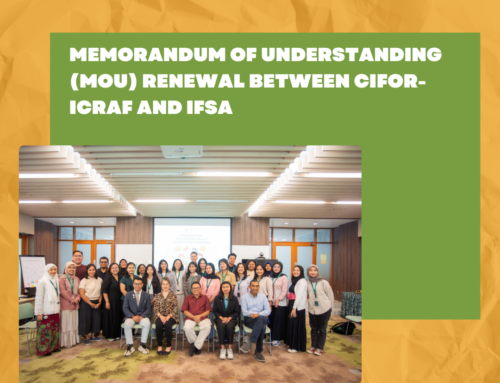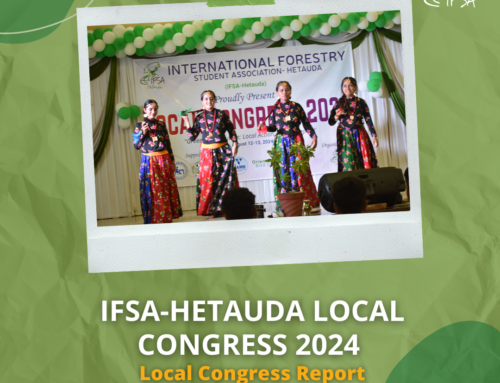Nigeria’s Cultural Day
The Culture of The Lion of Africa
Introduction
Nigeria’s Cultural Day was held on 9 January 2023 (UTC+0; 3-5 PM) at the Zoom Meeting which was presented by Adeleke Oluwatosin (IFSA LC OAUSTECH), Adewemimo Tolulope Stephen (IFSA LC FOWISA), Joshua Oluwafunminiyi (IFSA LC FUTA), Dr. Kayode Ogunsusi (Olusegun Agagu University of Science and Technology), and Dr. Johnson Adedayo Ogunjobi (Olusegun Agagu University of Science and Technology). The event was attended by more than 50 people.
Nigeria’s Cultural Things – by Adeleke Oluwatosin and Joshua Oluwafunminiyi
This session focuses on unique things about Nigeria. Nigeria has more than 257 languages and over 1150 dialects and ethnic groups. Moreover, there are three biggest ethnicities which are Hausas, Yoruba, and Igbo.
The Forest and The Indigenous People – by Dr. Kayode Ogunsusi
As of now, the definition of Indigenous People has no exact definition. Regardless of the difficulty of definition, Nigerian people define the authenticity of people through how close they are to nature or the place. The closeness refers to forest dependency for sources of food, employment, source of living, phytomedicine, Non-Forest Timber Product (NTFP), hosting, and protection of sites and landscapes. In Nigeria, the indigenous people use the NTFP to fulfill their livelihood for example canoe carving, broom making, beekeeping, fruit gathering for sale, and mortar and pestle production.
Moreover, Nigeria’s Indigenous people face two big issues including poor private investment and climate change. Climate change leads to loss/extinction of important plants and animals, flooding, loss of NTFP, the decline in bush harvesting, and desertification (depletion of water resources). Aside from the government program of developing rural forestry, the reality is it is still not able to realize its set objectives. Strict protection of the National Park access or privatization of forest land is not done through a competitive bidding process that most likely results in loss of access to livelihood resources that are not adequately compensated. The government most likely gave such obsolete annual royalties paid to indigenous communities for the government acquisition of forests. Other factors that become a problem are limited chances for work, poor remuneration, and the tedious nature of plantation jobs causing disinterestedness in plantation jobs.
In conclusion, Dr. Kayode Ogunsusi stated that it is important to note that the results of the colonial and neo-colonial period experienced by indigenous and the subsequent development of indigenous consciousness mean that no longer can ‘first peoples’ be seen as ‘other’ without rights, legitimate knowledge or legitimate cultural values.
Roles of Tradition and Local People in Forestry Development in Nigeria – by Dr. Johnson Adedayo Ogunjobi
Understanding the problem faced by the indigenous or/and local communities, they always have their own way to solve their problem which is usually portrayed through their tradition. For some time now, the roles of people in forest development have been of global concern. Community participation in forest development is building confidence and rapport among stakeholders, especially the NGO. There are some NGOs being highlighted during the event which are Wildlife Conservation Society (WCS), Pandrillus, Nigerian Conservation Foundation (NCF), Fauna and Flora International, and Initiative for Sustainable Agriculture and Ecological Restoration.
The traditions or in other words, the methods used by the people to protect their forest are quite simple which are no hunting near shrines or sacred places, no defecating around shrines, and no fishing at all in sacred water bodies. People recognize such negative vibes through signs like fines, deaths, diseases, madness, continuous menstruation, sacrifices, and missing out on the forest. Here are the lists of some notable sacred forests in Nigeria.
| Name | Location |
| Igunnuko Sacred Forest | Ogun State |
| Oro Sacred Forest | Ogun State |
| Osun Osogho Groove | Osun State |
| Igbo Ile | Oyo State |
| Igbo Oludumare | Ondo State |
| Agunabami Sacred Forest | Ebonyi State |
| Okija | Anambra |
Concept Note

Author: Wening Ila Idzatilangi
Presenters: Adeleke Oluwatosin, Adewemimo Tolulope Stephen, Joshua Oluwafunminiyi, Dr. Kayode Ogunsusi, and Dr. Johnson Adedayo Ogunjobi




